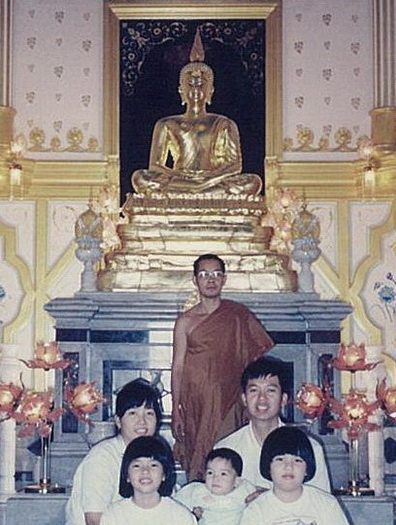Blessing Twelve:
Raising our children
C. ILLUSTRATIVE TALES
C.1 Ex. Buddha passes on legacy to son
The person with the best human relations in the world must have been the Buddha. He taught his father King Suddhodana until he could become an arahant. He taught his wife Yasodharā until she could become an arahant also. His son Rāhula also became an arahant. Rāhula asked to inherit the treasures of his father. Instead of giving him the throne he gave him the qualities of one free from defilement by having his child ordain from the age of seven.
All of the rest of his family and friends became arahants. His teachers died before he was able to teach them, but the group of five ascetics who had helped him in the past, all became arahants. Thus we must take a look at how he brought up his own children as well. What had the Buddha used to bring up his son to be so brilliant? He had given him the seven noble treasures [ariyadhana or bahukāradhamma] (D.iii.163, D.iii.267, A.iv.5):
1. Faith [saddha] Believing in the things that are worthy of belief.
2. Self-Discipline [sīla]
3. Shame of Evil [hiri]
4. Fear of the consequences of Evil [ottappa]
5. Knowledge [bahusacca]
6. Self-Sacrifice [cāga]
7. Wisdom [paññā]
C.2 Ex. Tilamuṭṭhi Jātaka(J.252): Necessity of punishment
Brahmadatta, son of the king of Benares, was sent to Takkasila to study. One day, when going to bathe with his teacher, he ate some white seeds which an old woman had spread in the sun to dry. He did this on three different days. On the third day, the woman reported him to the teacher and he was beaten. When Brahmadatta ascended the throne, he sent for his teacher, wishing to avenge this insult by killing him. The teacher did not come until the king had grown older, but when he did arrive, the sight of him so kindled the king’s hatred, that he ordered him to be put to death. The teacher however, told him that if he had not been corrected in his youth, today he would be a highway robber. Convinced that the teacher’s action had been due to a desire for his welfare, Brahmadatta showed his forgiveness and showed him all honour. The Jātaka was told in reference to a monk who showed resentment when advised.
J.ii.277ff.
C.3 Ex. Anāthapiṇḍika bribes son to learn Dhamma
Anāthapiṇḍika also had a son who was a troublemaker. He bribed his son to go to the temple. The son went to the temple and curled up and went to sleep there. He didn’t hear any teaching. As soon as he woke up he went home again to claim his prize. He got his prize and a new bribe — this time more — to go to the temple, listen to a sermon and remember one teaching well enough to relate to his father when he got home. If he could remember more than one teaching he would get more money. His father paid up each time and before long the son was going to the temple regularly. At first the son was only interested in the money. Later, the teachings started to be absorbed into his heart. One day the Buddha saw that the son was becoming more ready to understand the Dhamma and so that day He taught on a very difficult subject. The son tried his hardest to understand. Because the son’s mind was concentrated on only one thing then he could become a stream-enterer. That day when he went home and his father offered him money he wouldn’t take it saying that he already had some thing more precious within himself.
DhA.iii.189ff.
C.4 Ex. Godha Jātaka (J.141): Perils of not selecting a child’s friends
At that time the baby iguanas and the baby chameleons were the same size. The father iguana warned his son not to play with the chameleons saying that they were of a different grade. The baby iguana answered back saying, “Oh Dad! Don’t be such a snob. After all we’re all reptiles together!” The father advised, “It’s not just that we are reptiles, but we have a different physique and different habits. If you keep on associating with them, in the end, danger will come to our door.” However, with the wisdom of a father, he knew that his stubborn son would not listen and the result would bring disaster not only to himself but to the rest of the family of iguanas too. Therefore the father set to work digging an escape route at the back of their burrow. Before long, it was just as the father Iguana predicted — the baby iguana grew fast and strong. The chameleons grew only a little at a time. The baby chameleons were weighing a few hundred grammes but the baby iguana was several kilogrammes in weight. Now when they engaged in play-fighting as they used to do, the chameleon was beginning to get seriously hurt. The iguana didn’t realize his own strength. This time the chameleon had no mercy left for his old friend and it called to some hunters who were passing by and pointed to the iguanas’ burrow saying that they could catch something to eat there. The hunters pushed dry grass into all the openings of the burrow and set fire to it sending smoke deep inside the burrow. The baby iguana came running out of the burrow and was killed by the hunters. Many other iguanas in the family suffered the same fate. Only the father, smelling the smoke, immediately realized that his prediction had come true and made his escape by the escape burrow that he had dug for himself. (At that time the father iguana was the Buddha himself, the baby chameleon was Devadatta and the baby iguana was a bhikkhu who had associated with Devadatta and had caused a schism of the Saṅgha).
J.i.487ff.






